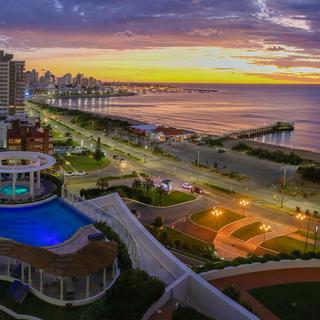
Plettenberg Bay weather and climate

Plettenberg Bay weather and climate
Day
19 °C
Night
8 °C
Sea
17 °C
Precipitation
51 mm
in month
Rainy days
7 days
in month
Daylight
10 hours
average
Sunshine
6 hours
average
Humidity
70 %
Weather charts for Plettenberg Bay

Find more destinations like this
Destinations with similar weather to Plettenberg Bay
Other destinations in Western Cape - South Africa
Closest cities for Plettenberg Bay
Weather overview for Plettenberg Bay
Weather overview
The coastal town of Plettenberg Bay, located in South Africa, typically experiences a warm tropical climate. Daytime temperatures usually fluctuate between a minimum average of 19 °C (67 °F) during the cooler month of July and an average high of 26 °C (78 °F) in the warmer month of February. When it comes to nocturnal temperatures, the warmest nights are in February with an average of 17 °C (63 °F), while the chilliest nights occur in July, averaging 8 °C (47 °F). The driest month on record is May with an average of 6 days experiencing precipitation, in stark contrast to October which is characterized by the most number of rainy days amounting to 8 days. Sea temperatures show a variation ranging from a low of 17 °C (62 °F) in the chill of August to the peak temperature of 21 °C (70 °F) as February radiates warmth.
January weather
As January unfolds in Plettenberg Bay, the upward trend of day temperatures becomes evident with readings around 25 °C (78 °F), accompanied by a noticeable increase in sea temperatures, reaching 21 °C (70 °F). Concurrently, rainfall quantities demonstrate a reduction from the preceding month, recorded at 50 mm (1.96 in). The nocturnal temperatures similarly trend upward, now averaging 17 °C (62 °F), just in time for the bustling tourist season.
February weather
During February, Plettenberg Bay experiences peak daylight temperatures, which average at 26 °C (78 °F), while sea temperatures also reach a yearly high. The month marks a subtle commencement of a gradual increase in the number of rainy days, averaging 8 days, amidst a backdrop of minimal rainfall for this time of year. Travelers continue to take delight in the vibrant tourist season, accentuated by the peak night temperatures averaging 17 °C (63 °F).
March weather
As March approaches its zenith, Plettenberg Bay's tourist season nears its climax. One can observe the commencement of a decline in sea temperature, now at 20 °C (68 °F), echoed by a similar downtrend in daylight temperature, registering 24 °C (76 °F). A rising trend in precipitation is noted, with measured rainfall at 57 mm (2.24 in). The humidity reaches a yearly apex as the night temperature begins its gradual decline, residing at 15 °C (60 °F).
April weather
April marks the continuation of tourist activities in Plettenberg Bay, as day temperatures witness a further descent, averaging at 23 °C (73 °F). Alongside, the sea temperature also observes a declining trend with current readings of 19 °C (65 °F). A decrease in the number of sunny hours to 7 hours is noted, as well as a continuation of the downward trajectory for nighttime temperatures, settling at 13 °C (56 °F).
May weather
In May, the daily temperature in Plettenberg Bay gradually cools to an average of 21 °C (70 °F), and there is a similar trend observed in sea temperatures which average at 18 °C (64 °F). The month sees the least amount of rainfall, with averages of 6 days, and a decline in total rainfall to 49 mm (1.92 in). Nighttime temperatures follow a descending pattern as well, marked by 11 °C (52 °F). There's also a notable reduction in the countert of cloudless sunny hours.
June weather
Transitioning into June, Plettenberg Bay experiences further cooling with average daylight temperatures reaching 20 °C (67 °F), paralleled by a downward trend in sea temperatures, now at 17 °C (63 °F). A gradual decline in night temperatures is also observed, averaging 9 °C (48 °F). An uptick in the number of rainy days commences, even as the sunniest hours each day reach a yearly minimum. The humidity level reaches its lowest point, registering at 69 %.
July weather
July in Plettenberg Bay signals the time of lowest daytime temperatures, with the thermometer averaging 19 °C (67 °F), and a parallel trend is seen in nighttime temperatures reaching their annual low. Significant reductions in wind speeds are noted during this month. The start of an increment in sunny hours is also observable.
August weather
With August in Plettenberg Bay, one can witness the onset of warmer day temperatures, although the sea still presents its chilliest temperature of the year at 17 °C (62 °F). A noticeable increase in rainfall to 70 mm (2.76 in) begins, as does the ascent of night temperatures which average at 9 °C (48 °F). A progressive increase in sunny hours to 7 hours is also discernible.
September weather
September welcomes a period of transition within Plettenberg Bay as the decline in rainfall becomes apparent with an average of 57 mm (2.23 in), and the start of reduced rainy days is observed. The night temperature continues to rise, recording 10 °C (50 °F), in a manner similar to previous months.
October weather
The onset of October in Plettenberg Bay heralds the peak of rainy days, averaging at 8 days, and coincides with the height of rainfall for the year. The commencement of rising day temperatures is also noted, now averaging 21 °C (71 °F), whereas night temperatures witness a parallel climb to 12 °C (54 °F). An upward trend in sunny hours to 8 hours and wind speeds reaching their yearly maxima is also observed.
November weather
The advent of November marks the start of the tourist season in Plettenberg Bay. A similarity in the rise of day temperatures is observed when compared to the previous month, now averaging 23 °C (73 °F), while a rise in sea temperature also commences. A declining trend in rainfall is noted with averages at 69 mm (2.71 in), and the increase in sunny hours progresses, now totaling 8 hours. The night temperature also witnesses an upward trend.
December weather
December in Plettenberg Bay indicates a continued increase in day temperature, averaging at 25 °C (76 °F), along with a corresponding rise in sea temperature, now at 20 °C (68 °F). The bustling tourist season is on the horizon. The peak in the number of sunny hours is evident, with readings averaging 9 hours. The zenith of daytime length also reaches 14 hours.
FAQs
Is Plettenberg Bay typically rainy in January?
No, January in Plettenberg Bay isn't characterized by heavy rainfall; expect roughly 8 days with some precipitation.
What kind of weather should one expect in Plettenberg Bay during February?
Expect mild and enjoyable weather in February in Plettenberg Bay, with temperatures that are warm but not uncomfortably hot.
Could you tell me about the sea conditions in Plettenberg Bay during March?
In March, the sea temperatures in Plettenberg Bay dip to about 20 °C (68 °F), which may not offer the most pleasant swimming experience for everyone.
What do nights feel like in Plettenberg Bay during April?
April nights in Plettenberg Bay register an average temperature of 13 °C (56 °F). While evenings may be enjoyable, it's wise to dress appropriately as it can get rather cool.
Can I expect dry weather if I travel to Plettenberg Bay in May?
Certainly, May is one of the drier months in Plettenberg Bay, so your visit will likely be accompanied by mild weather and minimal rainfall.
Is June considered a dry period in Plettenberg Bay?
No, contrary to being considered a dry period, June in Plettenberg Bay has an average of 7 days with rain.
What's the likelihood of cold weather in Plettenberg Bay during July?
In July, Plettenberg Bay graces its coolest climate, with the likelihood of experiencing the year's lowest day and night temperatures.
How does humidity change in Plettenberg Bay as we move into August?
In August, the humidity in Plettenberg Bay starts to slightly increase, reaching levels around 72 %.
What wind conditions can be expected in Plettenberg Bay during September?
Come September in Plettenberg Bay, anticipate moderate winds with average speeds around 4
During October, how many hours of sunshine does Plettenberg Bay typically see each day?
In October within Plettenberg Bay, the average count of sun-filled hours per day is near 8 hours
If I visit Plettenberg Bay in November, how often is rain expected?
Visiting Plettenberg Bay in November, you can expect an average of 8 days to be rainy.
What daytime temperatures are typical in Plettenberg Bay throughout December?
In December, Plettenberg Bay is known for its daytime temperatures that hover around a comfortable 25 °C (76 °F) on average.







